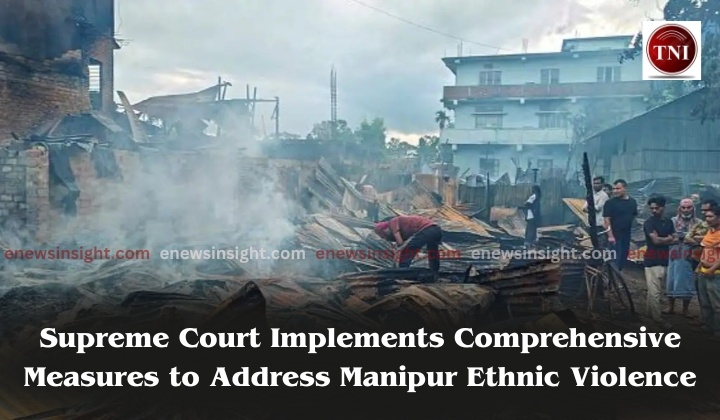New Delhi: In a significant move aimed at restoring faith in the rule of law and addressing the ongoing crisis of ethnic violence in Manipur, the Supreme Court of India has taken decisive steps. A three-judge bench, led by Chief Justice DY Chandrachud, has ordered the establishment of a three-member judicial committee to oversee remedial measures, compensation, and rehabilitation in relation to various incidents of ethnic violence in the state.
The committee, headed by former Chief Justice of the Jammu and Kashmir High Court Gita Mittal, will also include retired justices Asha Menon and Shalini P Joshi. This committee of esteemed jurists will undertake a comprehensive review of the investigation process, relief efforts, remedial measures, compensation distribution, and rehabilitation initiatives. The scope of their examination also extends to relief camps set up to support affected individuals.
The Supreme Court’s commitment to transparency and accountability is further underscored by its decision to appoint senior police officers of Deputy Inspector General (DIG) rank from outside Manipur to oversee the Special Investigation Teams (SITs) responsible for investigating the criminal cases related to the violence. This move aims to ensure impartial and thorough investigations. Additionally, the Court has mandated that Central Bureau of Investigation (CBI) teams assigned to these cases should also include senior officials from outside the state, emphasizing the importance of unbiased and fair proceedings.
Support Independent Journalism? Keep us live.
During the hearing, Manipur Director General of Police Rajiv Singh provided insights into the steps taken by the administration to address the ethnic violence. The state government has proposed the creation of SITs, led by superintendents of police at the district level, to probe sensitive cases. The CBI, on the other hand, has been entrusted with the investigation of 12 cases of crimes against women.
This development comes after the Supreme Court’s previous observation that there was a breakdown of law and order and constitutional machinery in Manipur. The ongoing ethnic clashes between Kukis and Meiteis have led to a distressing toll, claiming over 160 lives since May 3.
The Court’s proactive measures, including the appointment of a judicial committee and the involvement of experienced senior officials, are poised to have a far-reaching impact on restoring normalcy, justice, and security to Manipur. With a focus on accountability, transparency, and comprehensive remedies, these initiatives represent a significant stride towards addressing the complex challenges posed by the ethnic violence in the state. The Supreme Court’s continued vigilance and commitment to justice stand as a beacon of hope for the affected communities and the nation at large.


Comments are closed.